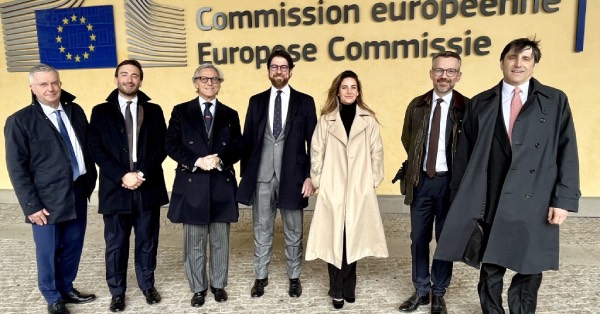
“Italian shipowners are on the front line on several EU and international dossiers, especially in relation to the decarbonisation of the sector; this is perfectly represented by our constant and competent participation to the main EU working tables. We are constantly advocating, via our Brussels-based office, the development of maritime traffic in Italy and other critical issues such as the necessity to revise the IMO’s CII metric. Recently, the EU Commission has demonstrated its readiness to support our request concerning IMO’s CII.”
This is Assarmatori President Stefano Messina’s statement at the end of the ‘two-day’ event participated by the top management of the Italian shipowners’ Association in Brussels.
“We have represented Italy’s role in the sector – Messina added – recalling that Italian shipowners are world leaders in the ro-ro/pax fleet, connecting the largest island community in Europe and key players for Motorways of the Sea services in the Mediterranean. This is also the reason why we are concerned about the IMO’s new CII, whose metrics urgently need to be revised. As it is conceived today, it leads to effects opposite to those of environmental protection, penalising precisely the Italian vessels that every day ensure the shift from road to sea. In regard to the Fit for 55 package, and in particular to the inclusion of shipping into the ETS, we have safeguarded several principles guaranteed by the Constitution such as the territorial continuity with the islands, especially with the smaller ones, with the necessity to foresee the same derogation also for Sardinia and Sicily in order to avert a sharp increase in transport costs. This is also important in view of the final trilogue negotiations on the FUEL EU Maritime regulation that will take place tomorrow in Brussels”.
“ETS revenues derived from maritime services in Italian ports must be allocated to the research and development of new technologies for maritime transport, such as alternative fuels. Again, we have reiterated how these fuels are unfortunately not yet available on a large scale with no adequate distribution and storage network in ports”, Messina concluded.
The first day Assarmatori delegation has been welcomed by Giovanni Cremonini, Head of Maritime Security Sector, Security and Defence Policy, at the European External Action Service (EEAS). A meeting at the Permanent Representation of Italy to the European Union followed, concerning the strategic negotiations related to shipping. In the evening, the ‘Assarmatori meets the EU’ dinner was to convene with several Members of the European Parliament, senior Executives from different Directorates General of the Commission, leading exponents of the European maritime and port cluster such as ESPO President Zeno D’Agostino and top leaders of the Italian political, institutional, military, diplomatic and industrial system in Brussels. Introductory speeches were given by Assarmatori President Stefano Messina, Fotini Ioannidou, Deputy Director of Waterborne Transport and Head of the Maritime Safety Unit (European Commission, DG MOVE) and Ambassador Stefano Verrecchia, Deputy Permanent Representative of Italy to the European Union.
Furthermore, Assarmatori Board members held a meeting with Walter Goetz, Head of Cabinet of the European Commissioner for Transport Adina Vălean and Roxana Lesovici, Cabinet Member with responsibility for Shipping. In conclusion, a working lunch in the European Parliament with several MEPs concluded the event.








































